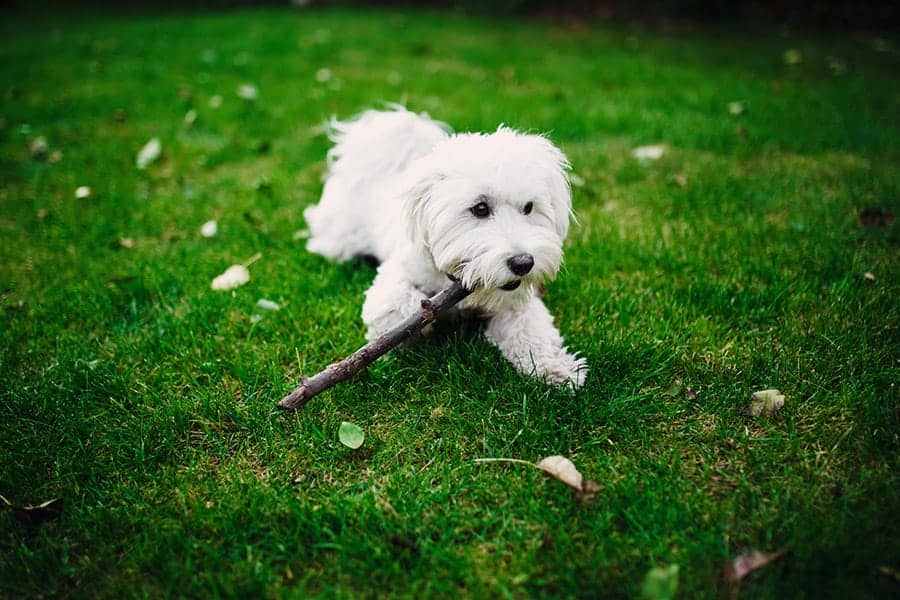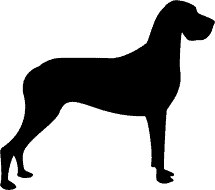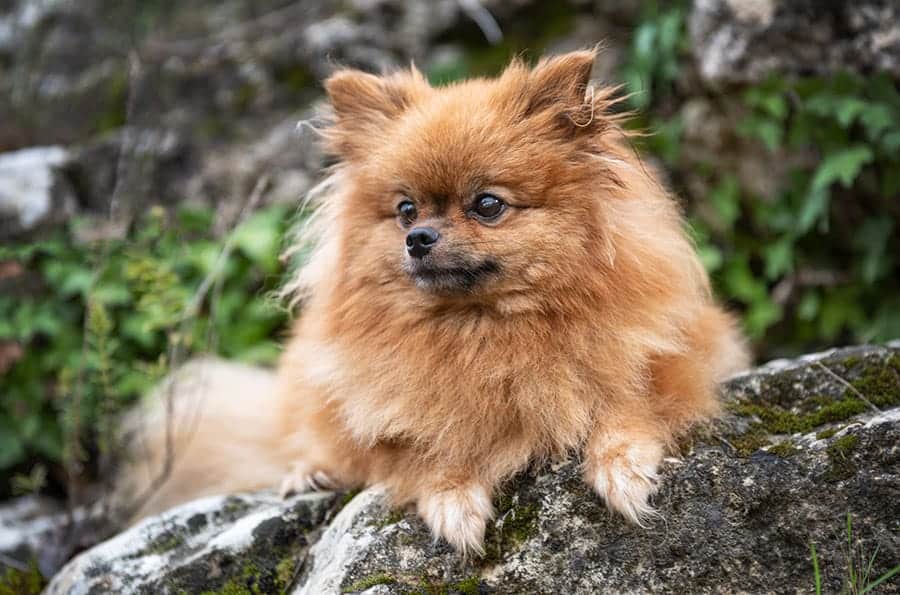Maltese
Published: Last updated: by Kyle J. Larson
This popular toy dog is simply adorable. He packs in white fluffy fur, a black button nose and saucer-sized eyes into a tiny little body weighing less than 7 pounds.
Average size and lifespan

Weight: 4-7lbs
Lifespan: 12 - 15 Years
Behavior
- Affection
- Kid-Friendly
- Stranger-Friendly
- Dog-Friendly
- Barking Amount
Care
- Grooming Difficulty
- Shedding Amount
- Easy to Train
- Can Be Alone
- Exercise Need
Environment
- Cold Tolerance
- Heat Tolerance
- Apartment-Friendly
Maltese Information
Charming, playful, and sweet, this pup brightens up any household. It’s no wonder the Maltese is one of the most popular toy dog breeds.
This breed has been in existence for nearly 3,000 years, as evidenced by their presence in ancient paintings, statues and ceramic art. Considering how adaptable the Maltese is, it’s no wonder they survived for so long.
With his long, white locks, it’s important to brush him daily and groom him often to keep him looking great.
Maltese History
Maltese is an ancient dog breed that was known by different names previously like “Maltese Terrier,” “the ancient dog of Malta,” “Melita,” “the Roman Ladies’ Dog” and “Maltese Sleeve Dog.”
The exact origin of this breed is still unknown, but it is thought to have been descended from a type of dog found among the Swiss Lake Dwellers. Some people also say that this breed is originated in Asia and is related to the Tibetan terrier. The breed has existed for the past 3000 years. Their existence has been evidenced by ancient paintings, statues, and ceramic arts which proves that these are very adaptable and thus survived for so many years.
Maltese Grooming
The Maltese has a long, silky and white coat but no undercoat. Some may have curly hair as well behind their ears. If someone loves dogs but has a dog allergy, then this breed is the best option for them as these don’t shed.
Regardless of their non-shedding trait, regular grooming is required to prevent the coat from getting loaded with mats. The grooming may include a common cut for Maltese known as the puppy cut which includes trimming and shaving the entire body hair (including the legs, chest, head fur) to one-inch length.
Exercise
No doubt, Maltese are exceptionally playful, jolly and loving pooches, however, they are not a highly energetic breed, and that’s is why they need a minimal amount of exercise. But, hey, don’t underestimate them, they are not lazy!
Exercise is essential for them because it helps to boost their immune system and repair their respiratory system. As a small breed, they have small joints and those need proper rest. Which is why it’s perfect to take them for a morning walk!
Yes, a regular morning walk helps them to manage their weight along with their proper healthy diet.
Maltese exercise needs
Exercise needs can easily be broken down into three main groups. These are:
- A daily walk
- Let them freely play with toys and other puppies.
- Mental Stimulation
To keep your Maltese healthy, he requires a daily walk of between 20-30 minutes

Training
Maltese are known as companion dogs. They are very playful and lively. Their energy level remains the same even if they age. They are very active and enjoy being inside the house making the house lively. They prefer enclosed spaces or small yards. They love humans and prefer to stay around them.
Some pups may get annoyed with small children and should be kept under supervision when allowed to play with them. However, this habit can be reduced if they are allowed to socialize with children at a smaller age.
Maltese Health
Maltese may have some tooth problems which may result in cavities and later on, they may fall out if not taken proper care of them as the dog ages. Therefore, one needs to take adequate care of their teeth by brushing teeth every week with a soft-bristled brush and special dog toothpaste to prevent cavities and other tooth problems.
Besides this, many Maltese may show signs of tear staining under the eyes. This depends on the dog’s eyes water and the size of tear ducts, but this can be a problem in this breed. To prevent this, solutions or powders made for tear stains are available in the market.
Sources: https://en.wikipedia.org/wiki/Maltese_dog, https://www.akc.org/dog-breeds/maltese/
All dogs have their own personality and unique training, causing them to differ slightly from these breed stats. However, please let us know if we made an error in the stats, we appreciate your help!
Breed FAQs
Can Malteses be apartment dogs?
The Maltese is an excellent apartment dog. They don't need as much space for activity and will be happy in a condo or apartment.
Can Malteses be left alone?
Malteses are extremely social and need lots of interaction with their owners. They don't like being left alone and will likely become destructive or anxious if left for long periods.
Are Malteses good with kids?
Malteses can do fine with kids. They will require some monitoring and training to make sure they get along and react well to unpredictable behavior.
Are Malteses friendly with strangers?
Malteses tend to be uncomfortable with strangers. They will require extra training effort to socialize them with those outside their family.
Do Malteses get along with other dogs?
Although Malteses will mostly get along with other dogs, they may have some issues. They can typically be dealt with by socializing them with other dogs.
Do Malteses bark a lot?
As far as dogs go, Malteses bark an average amount. You can expect them to bark to alert you, get your attention, or when there are strangers or other dogs.
Do Malteses shed a lot?
The Maltese rarely, or never, sheds. They're excellent for someone who doesn't want to clean up much dog hair.
Do Malteses need a lot of grooming?
The Maltese requires continued maintenance to keep their coats in healthy condition. They're not the most demanding but are on the higher end.
Do Malteses need a lot of exercise?
A Maltese will need a moderate amount of exercise to be happy. You'll need to plan some basic walks or fetch during the day.
Are Malteses easy to train?
Although Malteses can be a challenge to train, they can be taught with some dedicated work or by hiring some training help.
Can Malteses handle cold weather?
Expect Malteses to not do well with the cold. If you live in a cold climate you'll need to take special consideration for this breed.
Can Malteses handle hot weather?
Although Malteses can tolerate hot conditions, be careful not to expose them for too long.



 Getting a New Dog?
Getting a New Dog?